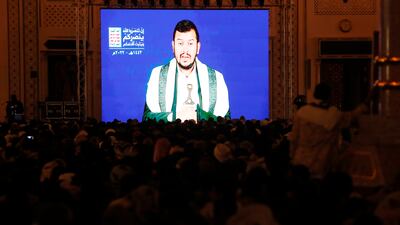Live updates: Follow the latest news on Israel-Gaza
Abdul Malik Al Houthi, leader of Yemen’s Houthi rebels, said on Thursday that US and British air strikes had no effect on the group, which has carried out regular attacks against ships in the Red Sea.
The Iran-backed Houthis have since November launched hundreds of drones and missiles at commercial vessels, disrupting trade. About 12 per cent of global seaborne trade passes through the Red Sea.
Mr Al Houthi said in his speech that “this week, eight ships have been targeted with 26 missiles and drones” and that the group carried out 153 attacks.
He also dismissed US air strikes on Houthi command and control positions in Yemen.
The US and UK have already suggested that their military strikes would have limited, if any, impact on the Houthis.
US President Joe Biden in January publicly admitted that US strikes on Houthi sites would not deter the militant group from its actions but they were to keep on.
“Are [the strikes] stopping the Houthis? No. Are they going to continue? Yes,” Mr Biden said.
Pentagon spokesman Maj Gen Pat Ryder said Mr Al Houthi's claims that the air strikes had no effect were inaccurate.
“They started with a certain amount of capability, and now they have a less amount of capability. So that’s just factually incorrect," Maj Gen Ryder said.
He said the US was not looking for a “full-scale” conflict with the Houthis and warned that the rebels' actions would ultimately hurt Yemeni citizens by making it harder to deliver aid and by harming the region's economic viability.
“The ultimate objective here is to ensure freedom of navigation through the Red Sea, and to continue to work with the international community to safeguard mariners that are transiting this area. And we’ll continue to do that,” Maj Gen Ryder said.
In January, UK Prime Minister Rishi Sunak said the strikes to “degrade and disrupt” Houthis' capabilities may be successful, but suggested that it may be a reactionary measure to send a message.
“It’s clear that this type of behaviour can’t be met without a response,” he said at the time.

AMr l Houthi repeated claims the group attempted to damage or sink the US aircraft carrier USS Eisenhower.
The Houthis said they hit the 100,000-tonne vessel, one of 11 “super carriers”, this month. The US has denied the claim.
The Houthis have sunk two civilian ships. The Rubymar was carrying fertiliser to Lebanon when it was attacked and the Tutor was carrying coal from Russia.
"The United States condemns the latest reckless and indiscriminate attacks on civilian ships by the Houthis," US State Department spokesman Matthew Miller said in a statement.
"This includes the deliberate attacks on the MV Tutor, which sank earlier this week."
Mr Al Houthi referred to the attack on the Tutor in his speech.
He said the Houthis planted explosives on the stricken vessel after it was struck by a drone boat. Video of the incident showed large blasts on the ship.
Several other vessels have been severely damaged in the Red Sea, including the now abandoned Ukrainian-owned Verbena. Four civilian sailors have been killed in the Houthi campaign.
"The Houthis previously killed three seafarers aboard the MV True Confidence on March 6 and sank the MV Rubymar on March 2, posing a critical threat to Red Sea ecosystems," Mr Miller also said.
"Houthi attacks continue to hinder vital humanitarian assistance from reaching Yemenis and pose dire risks to economic and humanitarian conditions in countries across the Red Sea region and to the broader global economy."
The Houthis say they are acting in support of Hamas will not stop its campaign until Israel ends the Gaza war, which has killed more than 37,400 Palestinians. The group claims to only target ships linked to Israel.
Al Houthi also condemned what he called Israel's “brutal, barbaric, criminal aggression against the Palestinian people”.
Shipping volumes in the Red Sea, and subsequently through the Suez Canal, have slumped by at least 55 per cent and in January the US and UK launched air strikes on Houthi positions in Yemen.
An EU-led mission has also been launched to protect ships in the region, but has not involved air strikes.
Critics say the Houthis have committed rights abuses in areas they control.
The group has seized about 30 per cent of Yemen, including the capital Sanaa.

